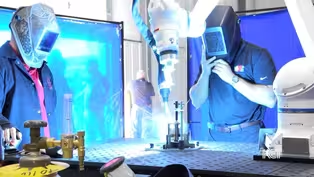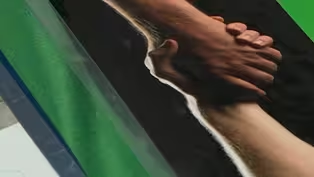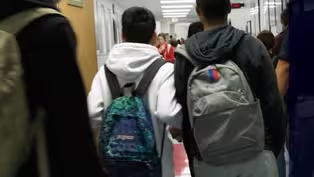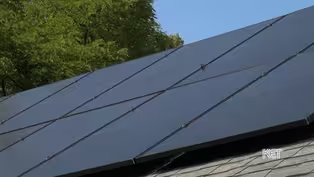
School Choice on the Ballot
Clip: Season 3 Episode 64 | 4m 5sVideo has Closed Captions
Differing views on school choice legislation.
Both sides of the school choice issue weigh in as Kentuckians get set to decide this November whether public money can be used for private schools,
Problems playing video? | Closed Captioning Feedback
Problems playing video? | Closed Captioning Feedback
Kentucky Edition is a local public television program presented by KET

School Choice on the Ballot
Clip: Season 3 Episode 64 | 4m 5sVideo has Closed Captions
Both sides of the school choice issue weigh in as Kentuckians get set to decide this November whether public money can be used for private schools,
Problems playing video? | Closed Captioning Feedback
How to Watch Kentucky Edition
Kentucky Edition is available to stream on pbs.org and the free PBS App, available on iPhone, Apple TV, Android TV, Android smartphones, Amazon Fire TV, Amazon Fire Tablet, Roku, Samsung Smart TV, and Vizio.
Providing Support for PBS.org
Learn Moreabout PBS online sponsorshipThis November, Kentuckians will decide whether to open the door for school choice legislation.
A ballot measure would allow the Kentucky General Assembly to authorize public money for private schools.
Supporters say it gives families more choice in how their children are educated.
Those against it say it will drain funding from public education, or Rogers examines both sides of the issue.
In Warren County.
Just watching game after.
Scoring, County Superintendent Rob Clayton paying a visit to the district's 212 Academy.
It's just a few weeks into the new school year, but Clayton's mind is already on early November.
We're talking about changing the Constitution without any understanding of how that change will impact public school funding.
He's referring to Amendment two, a ballot measure that would allow the state legislature to move forward on using public funds for private education.
You're going to find that anyone that has an understanding of how public school funds are dispersed across the Commonwealth, they're going to have grave concerns with amending our Constitution.
No school, no matter how good it is, can be the perfect fit for every child.
Despite concerns from some school administrators, supporters like Dr. Gary Hawkins say it would expand educational opportunity.
I became convinced some time ago that school choice policies are a great way to give ordinary families the same kind of privilege that affluent families enjoy every day.
Hawkins currently has one child in private school, another at a public high school.
It's not a rejection of the assigned public school.
If a family makes a different choice.
They're just saying for our particular child, this other school is the better fit.
And it's critical that our public schools are funded adequately to ensure that we are providing our students with opportunities that will set them up for success.
But Clayton says funding for public education has been challenging over the past two decades, and he fears this move would make things worse.
We're in a situation where it would require additional funds if we increase the number of students that are receiving taxpayer dollars to fund their education.
State education dollars will not move from a public school to a private school under anything that we could possibly do under amendment to the only way that a school could be significantly impacted by this is if lots and lots of students left the public school system.
And we just know from the experience of other states that that's not what happens.
Supporters say this amendment would make private schools more accessible for low income and marginalized families.
Milwaukee, for example, was one of the first communities that embraced school choice as a policy, and that movement was driven by low income, primarily families of color, who wanted more opportunities for their children.
But Clayton says his observation is that most families benefiting from vouchers are already sending their children to private schools.
We've seen it play out in numerous states that have gone down this path before us, and the data is very clear that the number of students, low income minority students taking advantage of these school vouchers and tax scholarship credits is minuscule.
Ultimately, Hawkins believes greenlighting school choice would help close the achievement gap.
Everybody in the state benefits when more kids are able to learn in school environments where they can truly thrive.
Meanwhile, Clayton says, public schools are the foundation of our democracy.
It's also a core component of economic development.
Educating 91% of our students.
Public schools are going to be here today.
They're going to be here 100 years from now.
Our business and industry leaders are counting on.
Us or Kentucky edition.
I'm Laura Rogers.
Kentucky voters will decide on Amendment two in the November 5th general election.
The Buzz on Mosquito-Borne Viruses
Video has Closed Captions
Clip: S3 Ep64 | 3m 36s | Kentucky's risk for mosquito-borne viruses. (3m 36s)
New Fill Plant to Open in Georgetown
Video has Closed Captions
Clip: S3 Ep64 | 3m 2s | Ribbon cut on new gas-manufacturing plant in Georgetown. (3m 2s)
Video has Closed Captions
Clip: S3 Ep64 | 2m 7s | Event brings attention to state's overdose rates. (2m 7s)
Video has Closed Captions
Clip: S3 Ep64 | 1m 32s | Findings from a new report on school safety in Kentucky. (1m 32s)
Solar Panel Program Grows in Lexington
Video has Closed Captions
Clip: S3 Ep64 | 3m 18s | Solarize Lexington offers progra for second year. (3m 18s)
Providing Support for PBS.org
Learn Moreabout PBS online sponsorship
- News and Public Affairs

Top journalists deliver compelling original analysis of the hour's headlines.

- News and Public Affairs

FRONTLINE is investigative journalism that questions, explains and changes our world.












Support for PBS provided by:
Kentucky Edition is a local public television program presented by KET




